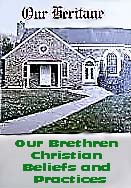A
PRAYER MEETING THAT WORKS
Jesus set the example
for us in every area, including how, why and what to pray. Prayer are answered especially when patterned after His.
"Wherefore he is able also to save them to the uttermost that come unto God by him, seeing he ever lives to make intercession for them." Heb. 7:25
"Who is he that condemns? It is Christ that died, yea rather, that is risen again, who is even at the right hand of God, who also makes intercession for us." Rom. 8:34
"My little children, these things write I unto you, that ye sin not. And if any man sin, we have an advocate with the Father, Jesus Christ the righteous." 1 John 2:1
Heb. 7:25; Rom. 8:34;
1 John 2:1 His constant intercession. And His are ALWAYS answered by His Father. So you might ask
for the grace of Jesus so that you will arrive at the answer to His prayer for
you knowing He has prayed for you and His Father answers His prayers always.
That is a prayer meeting that has positive answers ALWAYS.
Matthew 5:44 But I say, love your enemies! Pray for those who
persecute you!
Matthew 6:6 But when you pray, go away by yourself, shut the door
behind you, and pray to your Father in private. Then your Father,
who sees everything, will reward you.
Matthew 6:8-13 Don’t be like them, for your
Father knows exactly what you need even before you ask him! Pray
like this: Our Father in heaven, may your name be kept holy. May your
Kingdom come soon. May your will be done on earth, as it is in heaven. Give us
today the food we need, and forgive us our sins, as we have forgiven those who
sin against us. And don’t let us yield to temptation, but rescue us from the
evil one.
Matthew 9:38 So pray to the Lord who is in charge of the harvest; ask
him to send more workers into his fields.
Matthew 14:23 After sending them home, he went up into
the hills by himself to pray. Night fell while he was there alone.
Matthew 17:20-21 “You don’t have enough faith,” Jesus
told them. “I tell you the truth, if you had faith even as small as a mustard
seed, you could say to this mountain, ‘Move from here to there,’ and it would
move. Nothing would be impossible.
Matthew 19:13 One day some parents brought their
children to Jesus so he could lay his hands on them and pray for them.
But the disciples scolded the parents for bothering him.
Matthew 21:13 “It is written,” he said to them, “‘My
house will be called a house of prayer,’ but you are making it ‘a den of
robbers.'”
Matthew 21:22 You can pray for anything,
and if you have faith, you will receive it.
Matthew 26:36 Then Jesus went with them to the olive
grove called Gethsemane, and he said, “Sit here while I go over there
to pray.”
Matthew 26:39 He went on a little farther and bowed
with his face to the ground, praying, “My Father! If it is possible, let this
cup of suffering be taken away from me. Yet I want your will to be
done, not mine.”
Matthew 26:41 Keep watch and pray, so that you
will not give in to temptation. For the spirit is willing, but the body is
weak!
Matthew 26:53 Don’t you realize that I could ask my
Father for thousands of angels to protect us, and he would send
them instantly?
Mark 1:35 Before daybreak the next morning, Jesus got up and went
out to an isolated place to pray.
Mark 6:46 After telling everyone good-bye, he went up
into the hills by himself to pray.
Mark 11:24-25 I tell you, you can pray for anything,
and if you believe that you’ve received it, it will be yours. But when you are
praying, first forgive anyone you are holding a grudge against, so
that your Father in heaven will forgive your sins, too.
Mark 13:33 And since you don’t know when that time will come, be
on guard! Stay alert!
Luke 5:16 But Jesus often withdrew to the wilderness for prayer.
Luke 6:12 One day soon afterward Jesus went
up on a mountain to pray, and he prayed to God all night.
Luke 9:18 One day Jesus left the crowds to pray alone.
Only his disciples were with him, and he asked them, “Who do people say I
am?”
Luke 18:1 One day Jesus told his disciples a story to show that they
should always pray and never give up.
Luke 21:36 Keep alert at all times. And pray
that you might be strong enough to escape these coming horrors and stand before
the Son of Man.
Luke 22:32 But I have pleaded in prayer for you, Simon,
that your faith should not fail. So when you have repented and turned to me
again, strengthen your brothers.
Luke 22:40 There he told them, “Pray that you will
not give in to temptation.”
Luke 22:44 He prayed more fervently, and he was in such agony
of spirit that his sweat fell to the ground like great drops of blood.
John 14:16 And I will ask the Father, and he will give
you another Advocate, who will never leave you.
John 17:9 My prayer is not for the world, but for those
you have given me, because they belong to you.
John 17:15 I pray you should keep them from the evil one.
I’m not asking you to take them out of the world, but to keep them safe from
the evil one.
John 17:20 I am praying not only for these disciples but
also for all who will ever believe in me through their message.
























